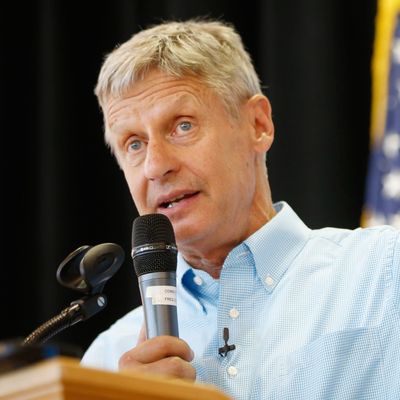
The perceived trajectory of the Libertarian Party’s presidential ticket is not all that positive. Gary Johnson and William Weld missed the polling threshold for inclusion in the debates. Their strength in national polls appears to be flagging a bit; Johnson was at 9.2 percent in the Real Clear Politics averages on September 13 and he’s now down to 7.3 percent. He has, of course, committed a couple of gaffes that did not help his cause.
But a new Albuquerque Journal survey from Johnson’s rarely polled home state of New Mexico over the weekend put the Libertarian Party back in the political news in a positive way. Johnson-Weld is at 24 percent in the Land of Enchantment, not far behind Donald Trump at 31 percent and Hillary Clinton at 35 percent. Nate Silver promptly came up with a plausible if still very remote scenario in which Johnson wins New Mexico’s five electoral votes and keeps the major candidates from winning a majority, throwing the contest into the House of Representatives (where, presumably, Trump would have an advantage).
With Libertarians nourishing a fresh fantasy of unprecedented electoral relevance, it is probably as good a time as any to take a long look at what their 2016 ticket might mean for their party and the “movement” it represents.
Let’s say for the sake of argument Johnson-Weld continues to fade down the stretch and loses half its current support. That would still represent well over three times the maximum percentage of the national popular vote the Libertarian Party has ever received; the previous high-water mark was in 1980, when Ed Clark (whose running mate was a fellow you may have heard of, named David Koch) won 1.07 percent of the vote.
From a purely practical point of view, a relatively high popular vote would help the Libertarian Party obtain automatic ballot status in more states, a privilege it already enjoys in 33. This status saves a lot of time, money, and energy that would otherwise go into petition drives for ballot access, and confers an incalculable amount of legitimacy and familiarity.
Beyond that mechanical achievement, there is the intangible asset of being mentioned in an awful lot of media accounts of the presidential election, which is not something Libertarians have often been able to count on in the past. Here’s where a peculiar psychological trait of serious Libertarians comes into play: Libertarianism is less a conventional political ideology than a Revealed Truth, which, precisely because it has never become a governing (or more precisely, non-governing) majority anywhere at any time, requires an intellectual conversion as complete and intense as any supernatural faith. And thus like religious sectarians thrusting their tracts on passers-by, Libertarians tend to think once citizens have been exposed to The Light, they will embrace it fiercely, and reject the old idols of the welfare state.
This conviction, and with it the hope of a sudden Dawn of Enlightenment, once was concentrated on the 2016 presidential candidacy of Rand Paul, thought to represent a potential fusion of conservatism and libertarianism. A famous 2014 Robert Draper piece in The New York Times Magazine explored the possibility that Paul ’16 could achieve a “Libertarian Moment,” which might not only conquer the GOP but perhaps the country.
Paul’s once-promising presidential campaign, of course, faded and died early in the cycle. That the actual GOP nominee was someone who represented an authoritarian impulse antithetical to libertarianism gave a fresh impetus to the Auld Church of the Libertarian Party.
But it is a very different development that will probably mislead Libertarians again into thinking that their anti-government movement is the wave of the future: the alienation (at least temporarily) of millennial progressives from the Democratic Party ticket, fed in no small part by the failed insurgency of Bernie Sanders. Polls consistently show millennials as Gary Johnson’s demographic stronghold. It’s unclear whether many of the young voters expressing a preference for the Libertarian candidate know much about him other than perhaps his support for legalized cannabis and his opposition to military interventions overseas. But you can forgive Libertarians for hoping that once detached from the two major parties, the next generation of Americans will abandon their interest in democratic socialism and find delight in a future without a social safety net, regulation of Wall Street, or campaign finance reform.
While Johnson’s current success among millennials probably should give pause to old socialists tempted to interpret Bernie Sanders’s “political revolution” as ushering in an anticapitalist era of American politics, it makes even less sense to project ephemeral candidate preferences among under-30 voters as pointing toward a heroic future where adolescents reading the novels of Ayn Rand keep them at their bedsides throughout life like the family Bibles of yore. It will be interesting to see whether Sanders himself (along with Barack Obama, and other politicians with special appeal among millennials) has success in informing his former followers that a political movement that includes the Koch brothers excludes everything his candidacy stood for. But unless support levels for Johnson-Weld decline calamitously between now and Election Day, this cycle will at the very least represent a fresh lease on hope for the party.






























